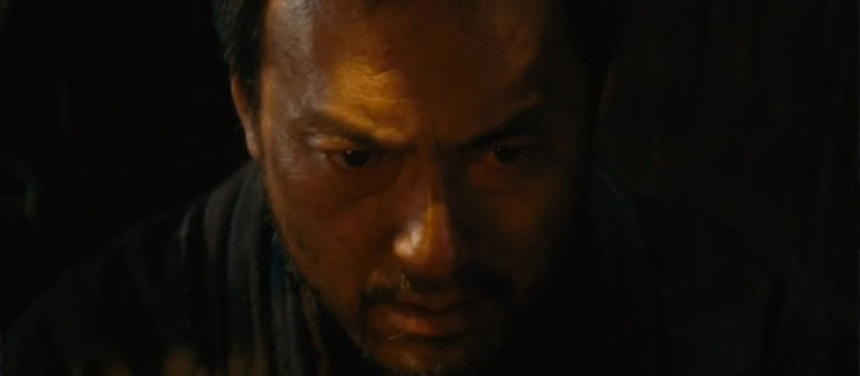TIFF 2013 Review: UNFORGIVEN, A Remake That Acts As Love Letter Rather Than Redux

In 1992, Clint Eastwood toyed with his own mythology with the extraordinary Unforgiven. Telling the tale of a former gunslinger forced out of retirement to settle one last score, it would go on to win a slew of Oscars, including Best Picture and Director for Eastwood. Decades later, this film still serves as a kind of eulogy to the traditional Western, an astonishing mix that both countenances and deflates the iconography of the film's star.
It's thus entirely fitting, if perhaps doomed to unfair comparisons, that this Western is being prepossessed within an Eastern setting. Trading oilskin jackets for Kimonos, Director Lee Sang-il manages to do the transplantation with more ease than I was expecting.
Before the screening at TIFF, Lee and his star Ken Watanabe asked the audience via an introductory video to be open minded. Watanabe spoke of the film being a kind of mountain, that we were to climb it together - the view would be similar, but hopefully the experience unique.
It's entirely fitting that it's Watanabe that's helping us climb this mountain. The actor worked closely with Eastwood in Letters from Iwo Jima, and he presents a similar kind of iconographic gravitas on screen.
Let's be explicit here - much, if not all of the pleasure of this version of Unforgiven is tied directly to the previous film. As a standalone project, it's highly interesting, but it's also hardly definitive. If anything, this remake demonstrates formally what worked so decidedly well within Eastwood's version, and what seems a little forced within the Japanese context.
Still, the film is quite an impressive ode to the other work, far less a mere redux than a kind of love letter to the previous film. Watanabe and the rest of the cast do their best to make the roles their own, as decidedly easy as it would have been to fall into imitation.
Despite the new setting and significantly altered political context, I'd suggest that this film is far more in keeping with the original than, say, A Fistful of Dollars or Last Man Standing is a lift of Yojimbo, or how overtly Magnificent Seven borrows from Kurosawa's Seven Samurai. This really is Eastwood's film set in Japan, with very little in the way of changes save setting from David People's original script. As such, it's even more difficult to evaluate it apart from the original work, even more challenging to see it as anything more than something that doesn't quite stand on its own.
In contrasting the two, we do lose a lot of that Eastwood magic - such a large part of what made the original work so well was the enormous baggage that the director/star brought to the role. Watanabe, through no fault of his own, simply lacks the same sense of a wizened character, his scowls and squints no match for Clint's. There's also a kind of calmness from the Japanese version that neuters some of the more raw emotions that the original film presented, and as such it simply feels that the stakes aren't quite as high.
The main addition to the narrative concerning indigenous Ainu does little to sway the film into originality, if anything it softens the real character drive that's the core of the film's plot.
As an interesting sideproject or homage, the 2013 version Unforgiven is a respectable piece, well acted with a decent script. It's a pretty mountain view, to borrow Watanabe's metaphor, but it's dwarfed by a far more impressive peak that's a far more satisfying climb. In the end, it's more interesting in concept rather than execution, a historically interesting project that if anything only highlights how significant and impressive Eastwood's 1992 original remains.

Do you feel this content is inappropriate or infringes upon your rights? Click here to report it, or see our DMCA policy.






